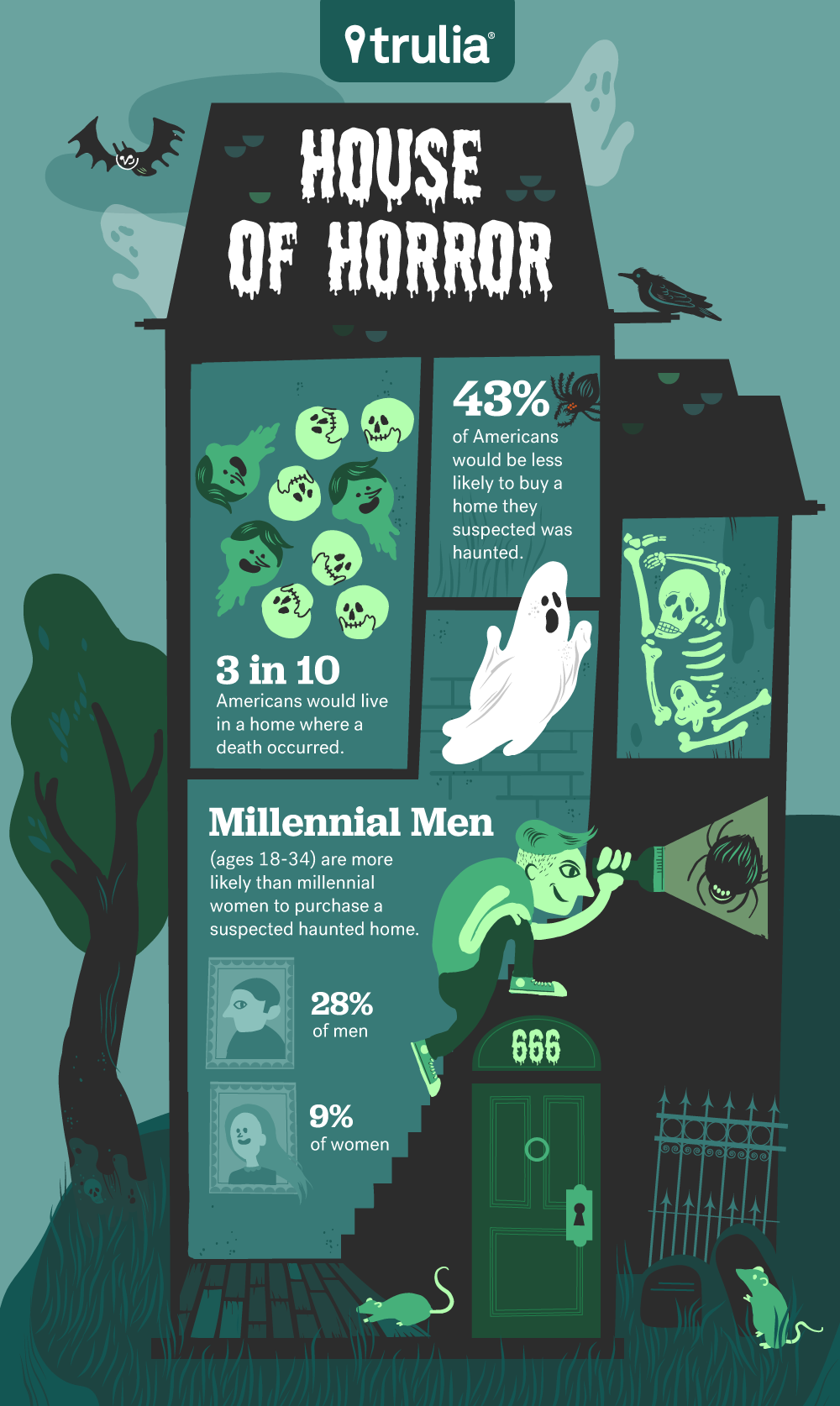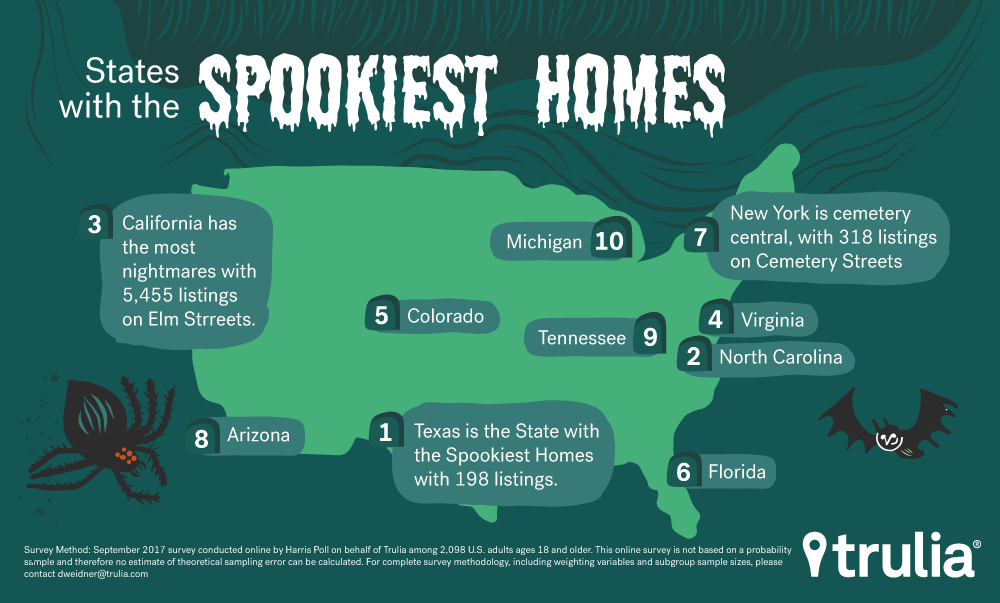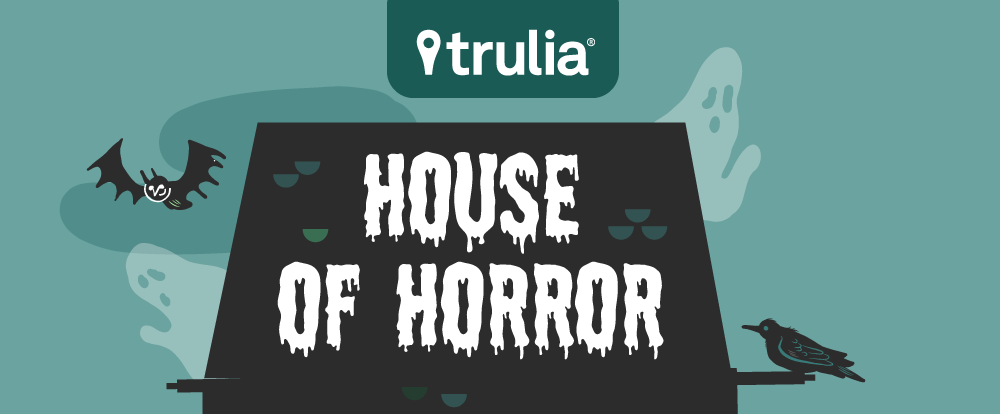House hunting just got a little bit scarier – that is, if you worry about some unwanted paranormal roommates.
Although paint touch-ups and landscaping can boost the appeal of your home, it may be smarter to host a séance. That’s because a haunted house can spook away homebuyers.
We found that most Americans consider both deaths and hauntings when finding their next home. Millennial men are the exception, with some possibly dying to live in a haunted home, according to Trulia’s September survey, conducted online by Harris Poll among 2,098 U.S. adults ages 18 and older.
With Halloween just around the corner, many Americans have fun celebrating this spooky time of year. But how many Americans really believe in the supernatural? Who is checking the basements and closets for ghosts and ghouls when they’re in an open house? Where do people draw the (chalk) line on how much horror they can handle at home?
Turns out, many Americans may fear the sinister in their homes. When asked if they would consider purchasing a haunted house, 43% of Americans say they would be less likely to buy a home if there was suspicion that something ghostly occurred there.
Additionally:
<!–[if IE 9]>
<!–[if IE 9]><![endif]–>

- Bring on the Scare: Only three in 10 Americans (30%) answered yes when asked if they would live in a home where a death had occurred.
- Macho Millennial Men: 28% of millennial men (ages 18-34) say they would be much or somewhat more likely to buy a home if there was suspicion that the property may be haunted.
- Seniors Aren’t So Spooked: 61% of those ages 65 and above say they are no more or less likely to buy a haunted house, compared to 45% of those ages 18-54.
- More Degrees, More at Ease: Only 33% of Americans with a graduate degree are somewhat or much less likely to buy a haunted house, lowest of any other education levels. This compares to 50% of those who completed some high school or less, 45% of those who completed high school/GED, 42% of college graduates/those who completed some graduate school, 41% who have associates degree or job-specific training.
Fear of Aging? Or Aging Away Fear?
Although many Americans may be spooked, there are some demographics that seem to be more afraid. Age and gender appear to have a strong influence on people’s feelings about the unnatural. What we found is when it comes to ghosts, the more gray, the more blasé.
Seniors were by far the age group most likely to be unfazed when it came to living in a haunted home. Compared to 45% of their younger counterparts (ages 18-55), 61% of seniors, aged 65 and older, say they are no or more less likely to buy a haunted house. When it came to living in a home where a death had taken place, older adults were also most likely to be unfazed, with 39% of those ages 55+ saying they would live there compared to only 24% of those ages 18-54.
Not So Afraid of Monsters Under Their Beds
While seniors are not disturbed by the prospect of hauntings, some millennial men appear to be not only unafraid but possibly eager to live in a haunted home. Of all male age groups, millennial men are the most likely to say they would purchase a home if there was suspicion it was haunted – 28% of millennial men would be more likely to purchase a home that may be haunted compared to just 7% of men ages 35+. Perhaps they are too busy looking at their phones to realize there is a ghost lurking.
Not in My House
Determining who’s most sensitive to hauntings came down to relationship status and education. It could be that having a partner around gives more peace of mind for the creatures that may be under the bed, because only 18% of singles said yes, they would live in a home where a death had taken place. This compares to 31% people who are married or living with a partner.
Levels of education also impact people’s likelihood to live in a haunted home. 50% of Americans without a high school degree are somewhat or much less likely to buy a haunted house, the highest proportion of all education levels to feel this way. Compare that to 45% of high school grads/GED’s, 42% of college grads/completed some graduate school, 41% with associates or vocational training and 33% of those with graduate degrees. So that’s what higher education is teaching these days.
Location, Location, Location
Regardless of whether you’re looking for a fright or avoiding the fear, it may be helpful to find out what lurks in listings. From streets with bad omens to live-in ghosts, we analyzed listings data to find the States with the Spookiest Homes. We looked at the most recent listing to find homes that included words like haunt, haunted and haunting. In addition, we checked our listings to find homes currently for-sale on streets named Elm, Fleet, Cemetery and Blood as well as homes that included some ghoulish terms in the listing descriptions.
The most sinister?
- Texas has the spookiest listings in the U.S. with 198.
- Looking for your own Nightmare on Elm Street? There are currently 46,680 homes for sale across the U.S. that are located on an Elm Street.
- Which state has the most? California with 5,455.
- If a demon barber is more your style, head to Maryland as there are 333 listings on a Fleet Street. But beware any bakeries or barbershops on your street.
- Across the U.S. there are 1,536 listings on a Fleet Street.
Whether you’re a believer or a denier, stock up on plenty of sage, salt and garlic this October and have a Happy Halloween.
<!–[if IE 9]>
<!–[if IE 9]><![endif]–>

Methodology
This survey was conducted online within the United States by Harris Poll on behalf of Trulia from September 21-25, 2017 among 2,098 U.S. adults ages 18 and older. This online survey is not based on a probability sample and therefore no estimate of theoretical sampling error can be calculated. For complete survey methodology, including weighting variables and subgroup sample sizes, please contact dweidner@trulia.com.
For our rank of the States with the Spookiest Homes, we looked at the most recent listings for every home and counted for words “haunted,” “haunting,” “murderer,” murdered,” “spooky,” “scary,” “ghost,” “zombie,” “cemetery,” “cursed,” “undead,” “horror,” “terrifying,” “eerie,” “creepy,” “frighten,” “ghastly.” We counted these by separately and for a total state count.
We counted the number of listings per state whose street names started with Elm, Devil, Hell, Fleet, Cemetery, and Blood. We counted the names separately, and then added them together for a total state count.


